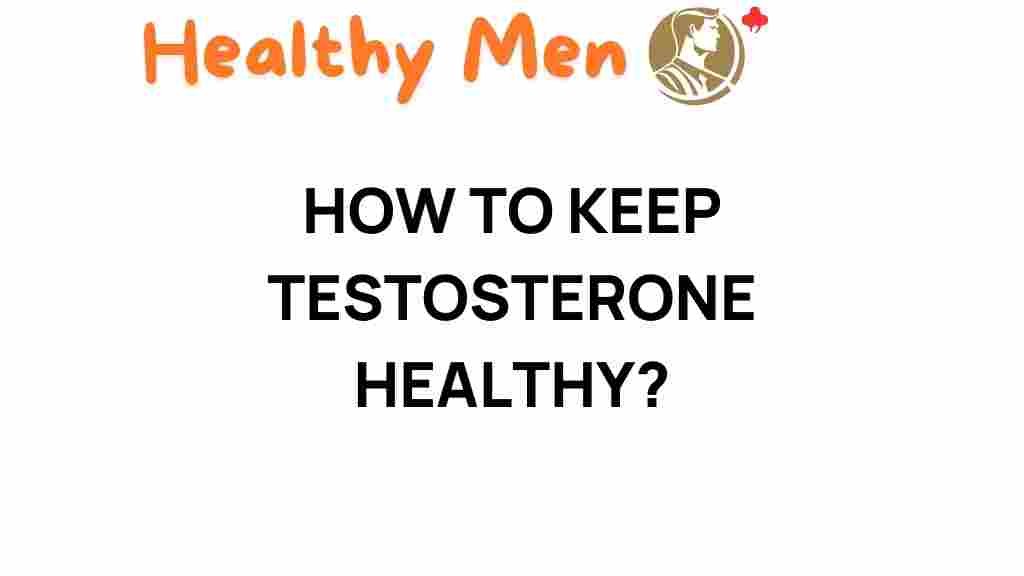Unlocking the Secrets to Maintaining Healthy Testosterone Levels
Testosterone is a vital hormone that plays a significant role in the health and wellness of both men and women. As we age, maintaining balanced testosterone levels becomes increasingly important for overall fitness, vitality, and quality of life. In this article, we will explore effective strategies to help you maintain healthy testosterone levels through lifestyle choices, diet, and fitness routines. Understanding the interplay between hormones, aging, and lifestyle is crucial for achieving optimal health.
Understanding Testosterone and Its Importance
Testosterone is often referred to as the “male hormone,” but it is present in both men and women, playing essential roles in various bodily functions. Here are some key functions of testosterone:
- Regulates libido and sexual function
- Supports muscle strength and mass
- Helps maintain bone density
- Influences mood and cognitive function
- Contributes to fat distribution
As we age, testosterone levels naturally decline, which can lead to various health issues such as decreased energy, reduced muscle mass, and mood changes. Therefore, it’s essential to focus on maintaining healthy testosterone levels throughout the aging process.
Factors That Affect Testosterone Levels
Several factors can influence testosterone levels, including:
- Age
- Diet
- Physical activity
- Sleep quality
- Stress levels
Understanding these factors can help you develop a comprehensive approach to maintaining hormone balance and overall wellness.
Step-by-Step Process to Maintain Healthy Testosterone Levels
Here are actionable steps that you can incorporate into your lifestyle to help maintain healthy testosterone levels:
1. Adopt a Balanced Diet
Your diet plays a crucial role in hormone production. Focus on incorporating the following foods:
- Healthy Fats: Include sources of healthy fats such as avocados, olive oil, and nuts. Fats are essential for hormone production.
- Lean Proteins: Consume lean meats, fish, eggs, and legumes to support muscle mass and hormone balance.
- Fruits and Vegetables: Aim for a variety of colorful fruits and vegetables to provide antioxidants and essential vitamins.
- Zinc and Magnesium: Foods rich in zinc (like oysters, beef, and pumpkin seeds) and magnesium (like spinach, almonds, and black beans) can support testosterone production.
Additionally, limit processed foods, sugars, and excessive carbohydrates, which can lead to imbalances in hormone levels.
2. Engage in Regular Exercise
Physical activity is a powerful tool for maintaining testosterone levels. Consider the following:
- Strength Training: Resistance training has been shown to boost testosterone levels. Aim for at least 2-3 sessions per week.
- High-Intensity Interval Training (HIIT): Short bursts of intense exercise followed by recovery periods can be effective in raising testosterone levels.
- Aerobic Exercise: Maintaining a healthy weight through regular aerobic activity can also support hormone levels.
Finding a workout routine that you enjoy will make it easier to stay consistent and see results.
3. Prioritize Sleep
Quality sleep is essential for hormone regulation. Here are some tips:
- Aim for 7-9 hours of sleep each night.
- Establish a regular sleep schedule by going to bed and waking up at the same time each day.
- Create a relaxing bedtime routine to signal to your body that it’s time to wind down.
- Make your sleep environment comfortable, dark, and quiet.
Good sleep hygiene can significantly impact your testosterone levels and overall health.
4. Manage Stress Effectively
Chronic stress can lead to elevated cortisol levels, which can negatively affect testosterone. Here are some stress management techniques:
- Meditation and Mindfulness: Practices such as meditation, yoga, and deep breathing can help lower stress levels.
- Regular Physical Activity: Exercise is a great way to relieve stress and improve mood.
- Seek Support: Connect with family, friends, or professionals to talk about your stressors and find solutions.
By addressing your stress, you can promote a healthier hormonal balance.
5. Consider Supplementation
In some cases, supplements may help maintain healthy testosterone levels. Before starting any supplement regimen, consult with a healthcare provider. Some commonly recommended supplements include:
- Zinc: Supports testosterone production and overall reproductive health.
- Vitamin D: Low levels of vitamin D have been linked to lower testosterone. Sun exposure and supplementation can help.
- Magnesium: As mentioned earlier, magnesium plays a role in testosterone production.
Always prioritize getting nutrients from whole foods, but supplements can be beneficial if you have specific deficiencies.
Troubleshooting Tips for Low Testosterone Levels
If you suspect you have low testosterone levels, consider the following troubleshooting tips:
- Get Tested: Consult with your healthcare provider to get your testosterone levels checked through a blood test.
- Review Your Medications: Some medications can affect hormone levels. Discuss alternatives with your doctor if necessary.
- Assess Lifestyle Factors: Review your diet, exercise routine, sleep quality, and stress management techniques to identify areas for improvement.
Addressing these factors can make a significant impact on your hormone balance.
Conclusion
Maintaining healthy testosterone levels is essential for overall health, wellness, and quality of life, especially as we age. By adopting a balanced diet, engaging in regular exercise, prioritizing sleep, managing stress, and considering supplementation, you can effectively support your testosterone levels. Remember, it’s crucial to consult with healthcare professionals before making significant changes to your health regimen.
For more information on optimizing your health and wellness, visit this resource. If you’re interested in learning more about hormone balance and its effects on aging, check out this article.
Start implementing these strategies today to unlock the secrets to maintaining healthy testosterone levels and enjoy a vibrant, energetic life!
This article is in the category Nutrition and created by healthymen Team
